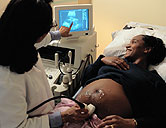
WEDNESDAY, Feb. 24 (HealthDay News) — Black women are much more likely than whites to develop a potentially deadly weakening of the heart muscle around the time they give birth, a new study suggests.
Symptoms of peripartum cardiomyopathy, which typically occurs in the last month of pregnancy or the first few months after delivery, include shortness of breath, particularly when lying down. The death rate is between 15 percent and 56 percent.
“When it hits, it’s totally unexpected because these are young, otherwise healthy women with young children. [They aren’t patients] you’d expect to have any sort of health problem, much less heart failure,” study corresponding author Dr. Mindy B. Gentry, a cardiologist at the Medical College of Georgia, said in a news release from the school.
In this study, Gentry and colleagues looked at cases of peripartum cardiomyopathy among women who gave birth at an MCG teaching hospital between July 2003 and July 2008. While 55 percent of the women who gave birth were white, 93 percent of the 28 women who developed peripartum cardiomyopathy were black. Of those 28 women, one died and another required a heart transplant.
Being black was the most important predictor of peripartum cardiomyopathy. Other risk factors include high blood pressure, being unmarried, smoking during pregnancy and having more than two previous pregnancies, Gentry said.
The study was published in the current issue of the Journal of the American College of Cardiology.
Gentry and colleagues said further research is needed to identify genetic and/or environmental factors associated with African descent that may explain the increased risk of peripartum cardiomyopathy in black women.
More information
The Cardiovascular Research Foundation has more about pregnancy and heart failure.

